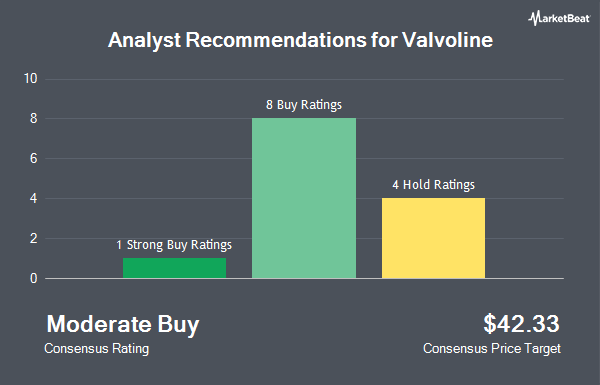Shares of Valvoline (NYSE:VVV - Get Free Report) have received a consensus rating of "Moderate Buy" from the fifteen analysts that are presently covering the firm, Marketbeat.com reports. Six analysts have rated the stock with a hold recommendation and nine have given a buy recommendation to the company. The average 1 year price objective among brokers that have updated their coverage on the stock in the last year is $42.7692.
A number of research analysts have recently weighed in on VVV shares. Stephens lifted their price target on Valvoline from $40.00 to $44.00 and gave the company an "overweight" rating in a report on Tuesday, July 29th. Cfra Research upgraded Valvoline to a "hold" rating in a report on Monday, July 7th. Wells Fargo & Company lifted their price target on Valvoline from $42.00 to $44.00 and gave the company an "overweight" rating in a report on Thursday, August 7th. Zacks Research upgraded Valvoline to a "hold" rating in a report on Tuesday, August 12th. Finally, Wall Street Zen upgraded Valvoline from a "sell" rating to a "hold" rating in a research note on Monday.
Get Our Latest Report on Valvoline
Valvoline Price Performance
Shares of VVV traded down $0.59 during midday trading on Friday, reaching $39.95. The stock had a trading volume of 1,344,009 shares, compared to its average volume of 1,406,083. Valvoline has a 52 week low of $31.01 and a 52 week high of $43.74. The company has a debt-to-equity ratio of 3.37, a current ratio of 0.73 and a quick ratio of 0.60. The firm's 50 day moving average price is $38.22 and its 200-day moving average price is $36.33. The company has a market capitalization of $5.08 billion, a P/E ratio of 18.58 and a beta of 1.21.
Valvoline (NYSE:VVV - Get Free Report) last announced its earnings results on Wednesday, August 6th. The basic materials company reported $0.47 earnings per share (EPS) for the quarter, topping analysts' consensus estimates of $0.46 by $0.01. The company had revenue of $439.00 million for the quarter, compared to analyst estimates of $436.35 million. Valvoline had a return on equity of 84.85% and a net margin of 16.43%.Valvoline's revenue for the quarter was up 4.2% compared to the same quarter last year. During the same period in the previous year, the firm earned $0.45 earnings per share. On average, analysts forecast that Valvoline will post 1.63 earnings per share for the current fiscal year.
Insider Buying and Selling
In other news, CFO J Kevin Willis bought 12,725 shares of the stock in a transaction on Thursday, August 14th. The shares were purchased at an average price of $39.41 per share, for a total transaction of $501,492.25. Following the completion of the purchase, the chief financial officer directly owned 12,725 shares of the company's stock, valued at $501,492.25. This trade represents a ∞ increase in their position. The purchase was disclosed in a filing with the Securities & Exchange Commission, which can be accessed through this link. 0.66% of the stock is owned by company insiders.
Institutional Trading of Valvoline
Several large investors have recently made changes to their positions in VVV. Maseco LLP acquired a new position in shares of Valvoline during the 2nd quarter worth about $27,000. Opal Wealth Advisors LLC acquired a new position in Valvoline in the 1st quarter valued at approximately $35,000. American National Bank & Trust acquired a new position in Valvoline in the 1st quarter valued at approximately $40,000. Versant Capital Management Inc raised its holdings in shares of Valvoline by 221.8% in the 1st quarter. Versant Capital Management Inc now owns 1,181 shares of the basic materials company's stock worth $41,000 after buying an additional 814 shares in the last quarter. Finally, Elevation Point Wealth Partners LLC bought a new stake in Valvoline during the 2nd quarter worth approximately $43,000. Institutional investors own 96.13% of the company's stock.
About Valvoline
(
Get Free Report)
Valvoline Inc engages in the operation and franchising of vehicle service centers and retail stores in the United States and Canada. The company, through its service centers, provides fluid exchange for motor oil, transmission and differential fluid, and coolant; parts replacement for batteries, filters, wiper blades, and belts; and safety services, such as tire inflation and rotation, bulbs, and safety checks.
Read More

Before you consider Valvoline, you'll want to hear this.
MarketBeat keeps track of Wall Street's top-rated and best performing research analysts and the stocks they recommend to their clients on a daily basis. MarketBeat has identified the five stocks that top analysts are quietly whispering to their clients to buy now before the broader market catches on... and Valvoline wasn't on the list.
While Valvoline currently has a Moderate Buy rating among analysts, top-rated analysts believe these five stocks are better buys.
View The Five Stocks Here

We are about to experience the greatest A.I. boom in stock market history...
Thanks to a pivotal economic catalyst, specific tech stocks will skyrocket just like they did during the "dot com" boom in the 1990s.
That’s why, we’ve hand-selected 7 tiny tech disruptor stocks positioned to surge.
- The first pick is a tiny under-the-radar A.I. stock that's trading for just $3.00. This company already has 98 registered patents for cutting-edge voice and sound recognition technology... And has lined up major partnerships with some of the biggest names in the auto, tech, and music industry... plus many more.
- The second pick presents an affordable avenue to bolster EVs and AI development…. Analysts are calling this stock a “buy” right now and predict a high price target of $19.20, substantially more than its current $6 trading price.
- Our final and favorite pick is generating a brand-new kind of AI. It's believed this tech will be bigger than the current well-known leader in this industry… Analysts predict this innovative tech is gearing up to create a tidal wave of new wealth, fueling a $15.7 TRILLION market boom.
Right now, we’re staring down the barrel of a true once-in-a-lifetime moment. As an investment opportunity, this kind of breakthrough doesn't come along every day.
And the window to get in on the ground-floor — maximizing profit potential from this expected market surge — is closing quickly...
Simply enter your email below to get the names and tickers of the 7 small stocks with potential to make investors very, very happy.
Get This Free Report
Like this article? Share it with a colleague.
Link copied to clipboard.